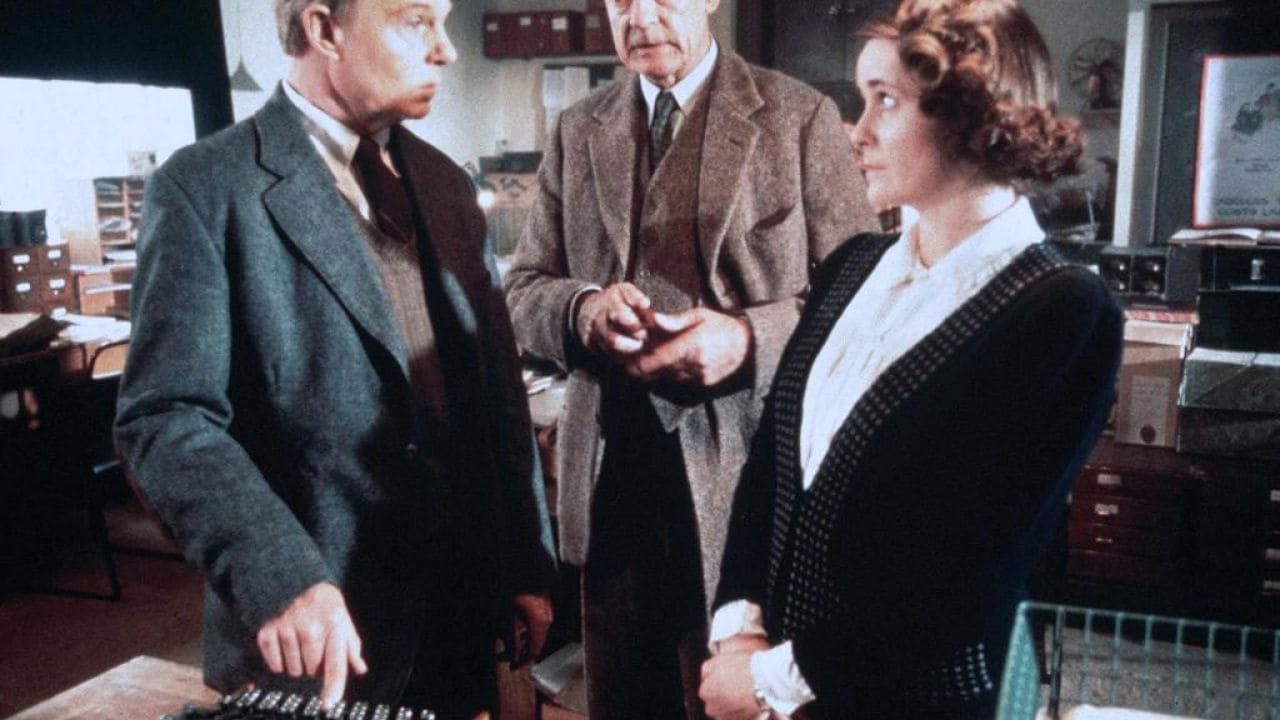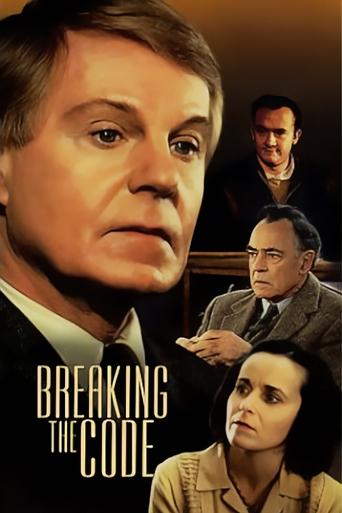

It's a low budget BBC version of a talky play about Alan Turing, a brilliant mathematician and homosexual who is haunted by the authorities and commits suicide. I don't know how the Brits do it. Here we are, churning out expensive pep pills like "A Brilliant Mind."Before watching it, I was a little afraid I'd get bogged down in math, a subject in which I have the skills of an ox. But there's not much about math in it. And the last thing we see of Turing being introduced to the Enigma machine, which controls the operation of German U-boats in World War II, is his pausing over this compact but complex apparatus, fingering his chin, and saying, "Hmmmm." He tries to explain it later, when the extent of bureaucratic interest in the interaction between his sex life and his secret research is becoming clearer to him, but he fails. I got more out of his impassioned spiel to his boss at Bletchley Park, Richard Johnson, when Turing goes on about "consistency, completeness, and decidability." I think I understood it because it has to do not just with math but with science in general. I got Goedel's paradox because Turing explains it so simply, and I got "decidability" only if it relates in the way I hope it does to Karl Popper. If that's wrong, I got lost.That would be disappointing because I wanted MORE of an explanation of what his work was about. Instead, most of the film deals with the "enigma" of his sexual life. It's hard now to believe exactly how primitive our views of sexuality were sixty years ago, both in Britain and elsewhere. And Turing was no manipulator. Aside from his brainstorms and his spells of mutual masturbation, he was naive, blunt, and sloppy. Derek Jacobi has Turing and his mannerisms -- his whole personality -- pinned down perfectly. It's a masterful performance.The rest of the cast does equally well. Turing's mother is the Queen of Denial. Richard Johnson is Turing's sympathetic but pragmatic boss at Bletchley. I've always admired Richard Johnson's work, ever since "The Haunting" (1963), in which he plays a character with my title and profession. Of course he's aged quite a bit and it sent me rushing to the mirror to make sure I was as radiantly youthful as ever. He does a marvelous job here as a bisexual who has learned the ropes. And, if nothing else, he illustrates exactly how ugly men's clothing was in 1940. If Turing had been a different sort of guy, he'd have leaped to his feet at their introduction and shouted, "That SUIT is a CATASTROPHE!" It's a sad movie though. It leaves us wondering why we can't leave other people to their own devices as long as they hurt no one. At the time, the official argument was that you can't have "nancy boys" in positions where security might be compromised by blackmail. The solution, of course, is simple. Make it all perfectly public and legal in the first place.
... View MoreI'm not interested in mathematics. Or the history of the computer. Or indeed, homosexual politics. But I am concerned with the talents, vicissitudes, suffering, blossoming, and achievements of human beings. And this is a tale full of humanity - and drama, as that humanity, and the talents and nature of Alan Turing are beaten down. The assault and damnation of his sexual orientation amount to a pervasive crime. It's about as dramatic a dynamic as you can find. And at the centre of it all: Derek Jacobi's remarkable performance. Forget I Claudius and Hamlet, this is his finest hour. Characteristically, he effortlessly takes us into the heart of Turing and allows us to feel his cleverness and his pain. His tender, acutely-observed performance induces us to rage, rage against the moon as this heroic character is beleaguered by the mores of the era, and in doing so, the deft Jacobi has somehow made the example of Turing one to benefit, push and shame mankind, as well as to inspire it to greater aspirations. A magnificent story, a magnificent, classic production, and an insurmountable performance at its heart.
... View MoreI came to this film thinking it would be about the code-breaking element of Alan Turing's life, his work on the famous Enigma code and computers and it took me a minute to get into the fact that the film is actually much more about him as a man in the later stages of his life. In this regard the film actually turns out to be more interesting than it would have been if it just focused on the work side of the man; certainly it serves up more for the writers and lead actor to work with.I think it was a coincidence but the film was shown recently on BBC4 around the time that Channel 4 was marking the 40th anniversary of the legalisation of male homosexuality in the UK, which is a theme that is central in this film. The material brings out the genius and imagination of Turing but also the tragic confession that saw his life under threat. The film leaves us in no doubt that Turing was fortunate in his situation but that the illegal nature of his (now commonplace) sexual relationship saw his life threatened regardless of what he had done in the past.It is this truth and this struggle that the film focuses on and it makes it more interesting as a result. Wise's direction is quite patient and still, which makes the film feel a little stagy and slow but works in the way it sits back and allows the cast to work. Specifically this serves Derek Jacobi well because his performance is impressive throughout, whether it is his passion for his subject or his sense of panic when he realises he has incriminated himself, he is convincing. Support is good from Armstrong, Scales, Pinter and others but the film does belong to Jacobi.Overall then this is a slow film that may frustrate some viewers with its pace or the way that it overlooks Turings work in favour of him as a man. This does work though and makes for an interesting character piece and, other than the pace the only issue I had with it was the fact that the film concludes with the news that Turing was later recognised by having part of a roundabout in Manchester named after him. Surely it would have been better to have closed the film by remembering his contribution rather than this rather weak platitude?
... View MoreI had never heard of Alan Turing, the mathematical genius behind the cracking of the German's `Enigma Code' during World War II, despite the fact that he was also heavily involved in the invention of the digital computer.And I was amazed to learn from this excellent biography of Turing (who should surely be remembered as a `celebrity scientist' in the Einstein class) that the reason for his burial by the British establishment is the simple matter of his sexuality. Yes, Turing was gay in an era when homosexuality was not only unfashionable but indeed illegal!Apart from the intrinsic interest of the subject, `Breaking the Code' is illuminated by a superb performance from Derek Jacobi (with a hint of his 'I Claudius' stammer) who brilliantly conveys not only Turing's fierce intelligence but also his enthusiasm for his discipline and his need to pass on this passion to his colleagues.Supporting roles are well cast and played with playwright and sometime actor Harold Pinter not out of place beside veterans Richard Johnson and Prunella Scales but Jacobi's tour-de-force is the thing.I hope I have encouraged you to see this British made-for-tv movie if you get a chance.
... View More